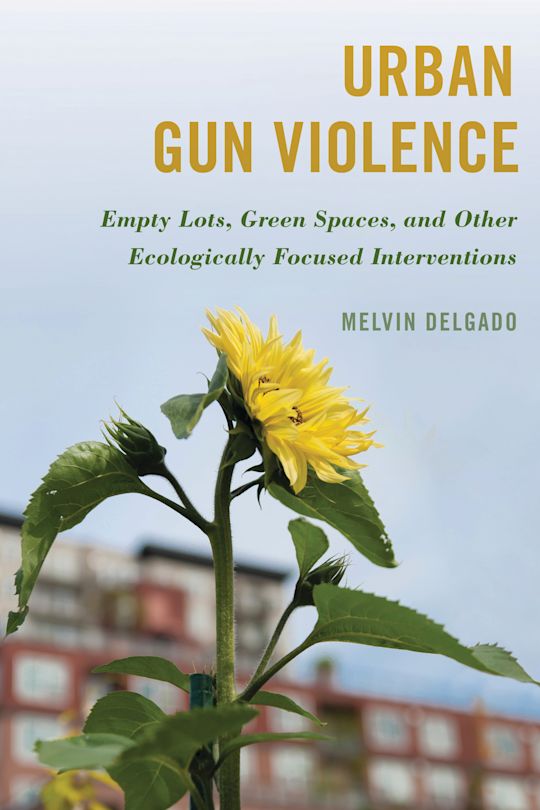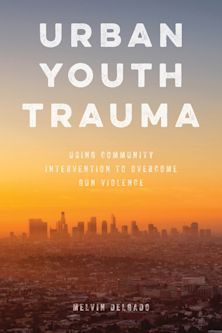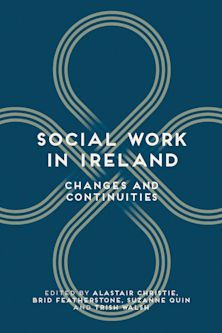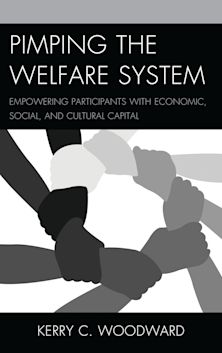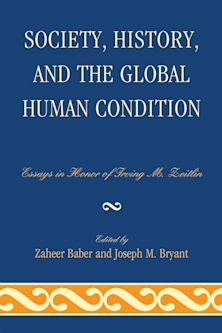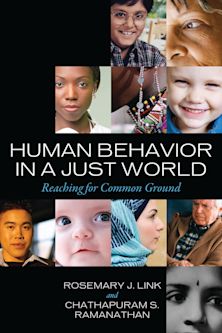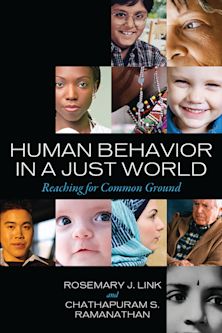- Home
- ACADEMIC
- Social Work & Social Welfare
- Social Work - Other
- Urban Gun Violence
Urban Gun Violence
Empty Lots, Green Spaces, and Other Ecologically Focused Interventions
- Textbook
Urban Gun Violence
Empty Lots, Green Spaces, and Other Ecologically Focused Interventions
- Textbook
For information on how we process your data, read our Privacy Policy
Thank you. We will email you when this book is available to order
Buy from Bloomsbury eTextBooks
You are now leaving the Bloomsbury Publishing website. Your eBook purchase will be with our partner https://www.vitalsource.com.
Your credit card statement will show this purchase originating from VitalSource Technologies. They will also provide any technical assistance you might require.
You must sign in to add this item to your wishlist. Please sign in or create an account
Description
Ecologically-focused interventions have taken center stage in addressing a range of social problems. This book synthesizes the latest research and theoretical advances of these approaches to offer multiple urban green revitalization strategies for combatting gun violence that is primarily impacting African-American/Black, Asian-American, and Latinx urban communities across the nation. Solutions include the introduction of greenspaces (greening), conversion of distressed buildings and vacant lots, and other structural changes to a community. This resource provides readers with a centralized place to draw upon research findings and includes illustrative case studies. Current and future social workers and other helping professionals will be able to work more effectively with the communities of color they serve to bolster interventions and advocate against gun violence.
Table of Contents
SECTION I: CONTEXT SETTING
Chapter 1: Introduction
Chapter 2: Socioecological and Community Assets: Capacity Enhancement Conceptual Foundation
Chapter 3: Community Gun Violence and Community Trauma
Chapter 4: Statistics and Strategies for Addressing Gun Violence
SECTION II: MULTIFACETED VIEWS OF VACANT LOTS
Chapter 5: Vacant Lot Remediation: Context Setting
Chapter 6: Vacant Lot Remediation
Chapter 7: Potential Benefits/Detriments of Converting Vacant Lots
SECTION III: CASE ILLUSTRATION
Chapter 8: Case Illustration (Urban Neighborhood Initiatives, Southwest Detroit)
SECTION IV: LESSONS FOR THE FIELD
Chapter 9: Research
Chapter 10: Vacant Lots: Practice and Educational Implications
References
Index
About the Author
Product details
| Published | Apr 11 2023 |
|---|---|
| Format | Ebook (Epub & Mobi) |
| Edition | 1st |
| Extent | 324 |
| ISBN | 9781538166475 |
| Imprint | Rowman & Littlefield |
| Illustrations | 9 b/w photos; 2 tables |
| Publisher | Bloomsbury Publishing |
About the contributors
Reviews
-
Delgado argues that a strategy involving the remediation and "greening" of vacant lots (including gardening) has considerable potential to reduce gun violence at the micro-level in urban neighborhoods (p. 24). The book begins with an extensive review of the academic literature on the causes of gun violence in American cities and ways to alleviate it. In the latter half of the volume, the author posits an intervention strategy focused on the remediation of vacant lots tailored to the needs and situations of local neighborhoods. In support of his argument he presents a case study from Southwest Detroit. This book primarily geared toward students and scholars working in the fields of urban social work, urban sociology, urban geography, and urban planning. Practitioners in the field working at institutions such as neighborhood development organizations and local planning agencies may also find this work interesting. Recommended. Advanced undergraduates through faculty; professionals.
Choice Reviews
-
Melvin Delgado is among the most highly productive in his fields, and his books are among the highest quality available. Gun violence is a national crisis, and the approach presented here iss highly innovative. Delgado argues and makes a successful case for the notion that gun violence might be addressed by placing emphasis on vacant lots as an organizing vehicle and, in so doing, shift from the familiar emphasis on national initiatives to the neighborhood as a unit of solution.
Barry Checkoway, University of Michigan
-
This book takes a broad look at the problem of urban violence and the trauma it creates in communities; examines extant efforts to address gun violence, their potential, and their limitations; and explores the potential contribution that environmentally-focused interventions can make to reduce gun violence—especially the reclaiming and repurposing of vacant land in urban neighborhoods to create green civic spaces. It focuses on a couple of illustrative examples in different cities and teases out implications for research and education.
Robert J. Chaskin, McCormick Foundation Professor, faculty director of Kiphart Center for Global Health and Social Development, and UNESCO Chair for Inclusive Urbanism, University of Chicago
-
This book proposes an interesting and understudied approach to reducing gun violence in an accessible way. The conversational nature of the writing makes it an enjoyable read while making a persuasive case for the role of lot remediation in addressing gun violence. The author illustratively discusses how significantly lot remediation can change vacant spaces into something beneficial and a point of pride for the local community. Delgado does an excellent job of grounding his analysis in the needs of the community itself, rather than a generalized one-size-fits-all solution. The consideration of the role played by space and location in gun violence and crime is incredibly important in developing a better understanding of the complex nature of gun violence.
Benjamin Gonzalez O'Brien, San Diego State University
-
Delgado integrates ecological theory with place-based and trauma frameworks to advance our conversations around community safety, gun violence, and resilience toward equity-minded solutions. The interdisciplinary lens provides an important foundation for scholars, students, practitioners, policy makers, and urban planners to come together to address this most pressing public health crisis with comprehensive community-driven approaches.
Kristen P. Goessling, PhD, Philadelphia Participatory Research Collective
-
This book is thorough, conceptually refreshing, and engaging. The ecological approach and framework of identifying the complex issues related to gun violence in city contexts, the assets and community enhancement paradigms, and the prescription of green spaces and vacant lot community interventions is highly effective. Dr. Delgado is a prolific author and it is clear that he brings a keen eye to ways to describe phenomena with tremendous detail without belaboring the point. His focus on providing a clear counter narrative to the conventional deficit-oriented, bleak depiction of city-based communities is not only refreshing, it is desperately needed.
As an inner-city person myself, I have centered shining a light on the inherent beauty that exists on city streets pocked by blight but also full of people that have formed informal social networks of care and responsiveness to peoples’ needs. We have had to, as it has been clear for decades that our policymakers are not willing to attend to our needs in effective or meaningful ways. Dr. Delgado does a remarkable job of nimbly interjecting insight to these informal social controls and offers prescriptions to social phenomena that are feasible, relatable, and that have an impact at individual and community levels.
The material is well-researched and provides clear connections between socio-ecological approaches, policy initiatives, and the promising potential of re-investing in cities as spaces, places, and homes of remarkable people with promise.Caroline N. Sharkey, University of Georgia









